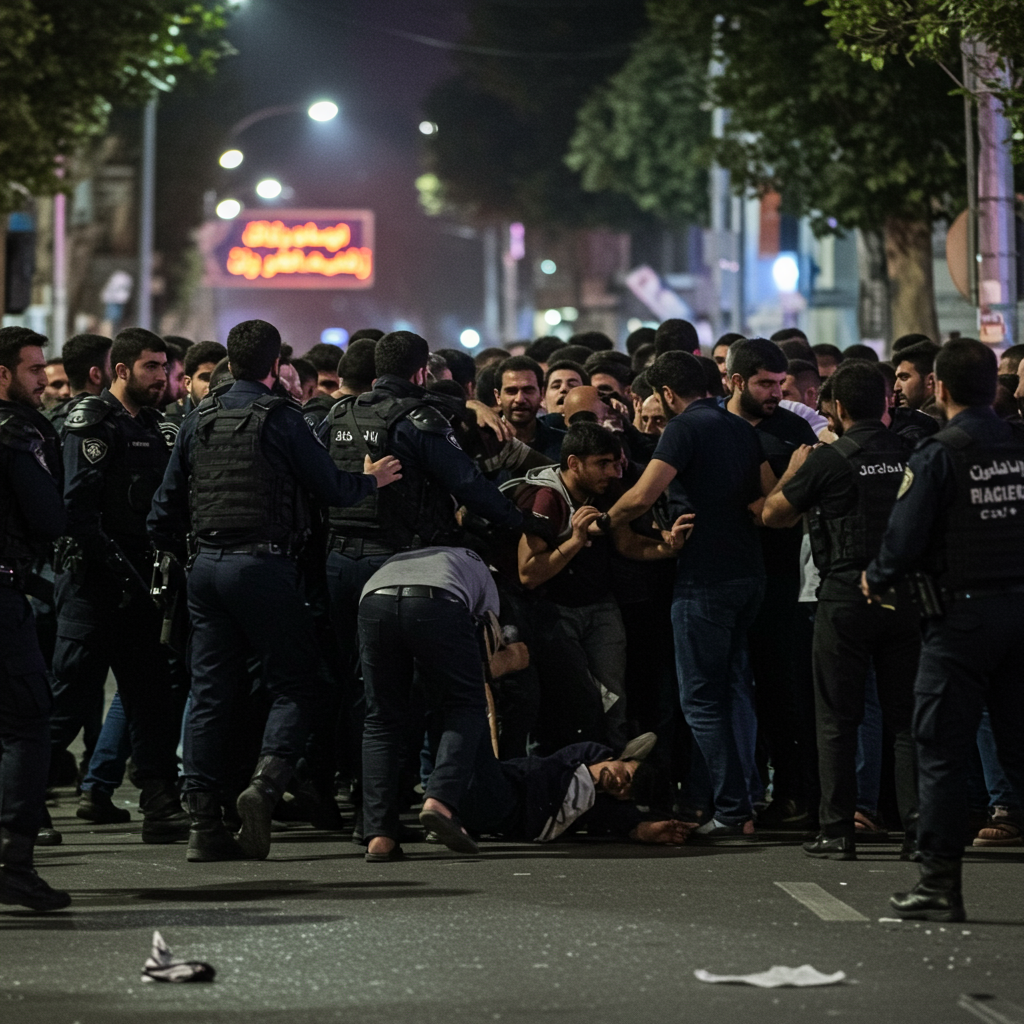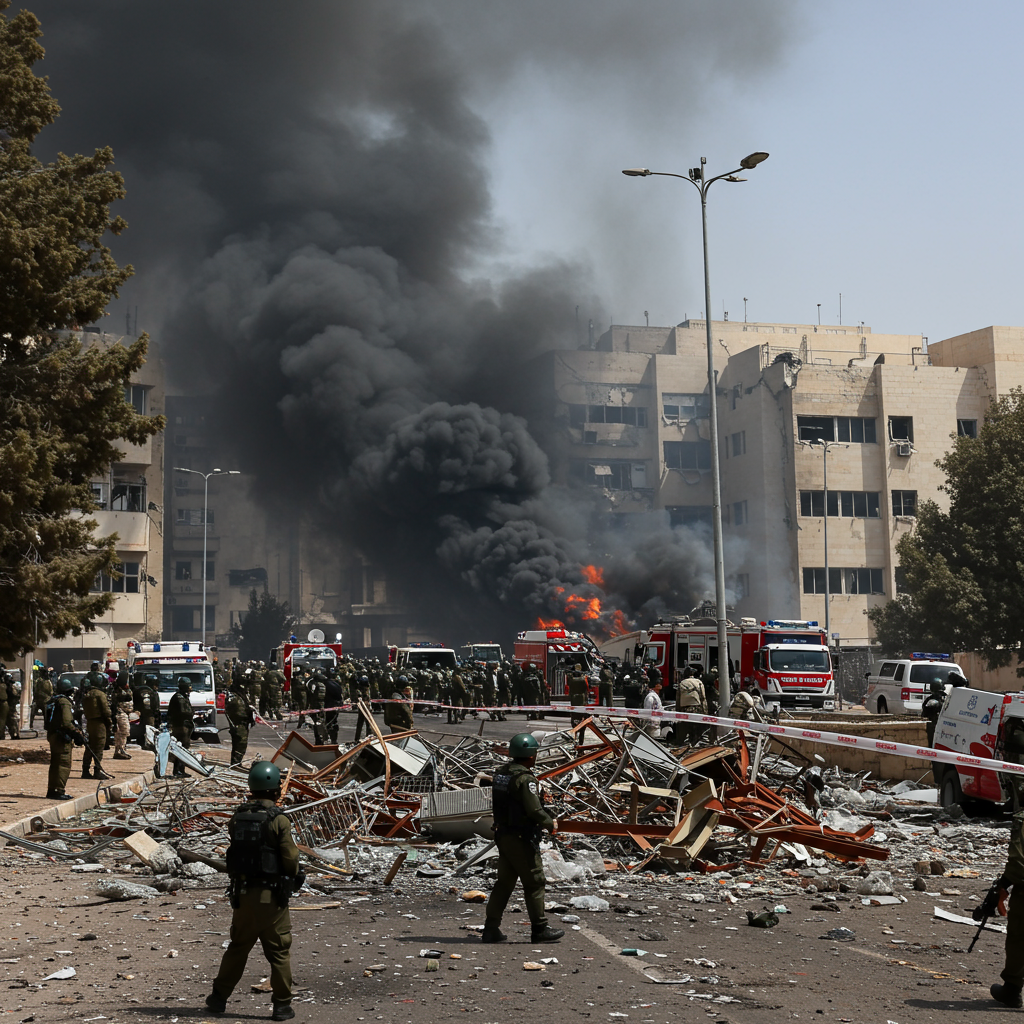Glastonbury 2025, a festival known for its vibrant music and often outspoken politics, saw performances by the bands Bob vylan and Kneecap become the subject of a criminal investigation by UK police. This unprecedented move follows controversial chants and statements made during their sets, primarily concerning the conflict in Gaza and political figures. The incident has ignited intense debate about freedom of expression on major stages and the boundaries of political protest in music. Authorities have cited public order concerns and are reportedly examining potential hate crime legislation in their inquiry.
Unpacking Bob Vylan’s Contentious Glastonbury Set
The rap-punk duo Bob Vylan, celebrated for their politically charged music tackling issues like racism and social inequality, took to the West Holts stage. Lead singer Bobby Vylan reportedly addressed the large crowd with explicit political messages. Among these were chants advocating for Palestinian freedom. However, the performance gained significant notoriety for a more provocative chant: “death, death to the IDF.” The set was broadcast live by the BBC, amplifying the reach and subsequent backlash.
The reaction was swift and strong. Both the BBC and Glastonbury organizers issued condemnations. The BBC described Bobby Vylan’s sentiments as “utterly unacceptable,” regretting that the live stream wasn’t pulled sooner and announcing a review of their broadcast guidelines. Glastonbury organizers echoed this sentiment, stating the comments “crossed a line.” They emphasized the festival’s stance against war and terrorism, while clarifying there is “no place” for antisemitism, hate speech, or incitement to violence at Worthy Farm.
Beyond the UK, the controversy drew international attention. The United States State Department announced it was revoking the US visas for the two members of Bob Vylan. A US Deputy Secretary of State publicly stated that individuals who “glorify violence and hatred” are unwelcome visitors. Professionally, the fallout continued for Bob Vylan, with reports indicating they were dropped by their talent agency, UTA, following the performance. Despite the intense scrutiny and consequences, Bobby Vylan reportedly defended his actions on social media, asserting the importance of teaching future generations to advocate for change.
Kneecap’s Stirring Performance and Historical Scrutiny
Northern Irish rap trio Kneecap also performed on the West Holts stage, known for their blending of Irish and English lyrics and outspoken political views. Their set, though not broadcast live by the BBC (which made it available on demand later), featured prominent pro-Palestinian messaging. Reports describe a large crowd waving Palestinian flags during their performance. Messages displayed on screens reportedly declared that Israel was committing genocide and that the UK government was aiding this.
Adding another layer of controversy, Kneecap reportedly led the crowd in a profane chant targeting UK Prime Minister Keir Starmer. Starmer had previously voiced criticism about their booking at the festival. This backlash against Starmer connects to historical controversies surrounding the band, specifically member Liam Óg Ó hAnnaidh, who performs as Mo Chara.
Mo Chara had faced a charge of supporting a proscribed organization in 2024 for allegedly waving a Hezbollah flag at a London concert. He denies this charge, which was later dropped by UK prosecutors due to time limits. The group had also previously faced scrutiny over an older video where a member allegedly called for the death of British Conservative MPs – charges that were also dropped. At Glastonbury, Mo Chara reportedly addressed his past terror charge, labelling it “trumped up.” The band dedicated their song ‘Get Your Brits Out’ to Starmer, clarifying their criticism was aimed at the “English government,” not the people.
Official Investigations and Political Firestorm
The controversial performances prompted action from law enforcement. Avon and Somerset police in the UK confirmed they had launched a criminal investigation. The police statement classified the matter as a “public order incident” in its initial stages. Crucially, the statement indicated the investigation would be “evidence-led” and would “closely consider all appropriate legislation, including relating to hate crimes.” This suggests authorities are exploring whether the language used could fall under UK laws prohibiting incitement to hatred or violence.
The political reactions were swift and varied. The Israeli embassy in London expressed being “deeply disturbed” by the “inflammatory and hateful rhetoric” at the festival. The Campaign Against Antisemitism announced plans to file a formal complaint with the BBC regarding the broadcast of Bob Vylan’s set. UK Prime Minister Keir Starmer condemned the chants as “appalling hate speech” and questioned why such performers were given a platform, demanding an explanation from the BBC.
Adding complexity to the political landscape, UK Minister Wes Streeting also commented on the situation. While condemning the chants as “appalling,” he also publicly told the Israeli embassy to “get your own house in order,” citing concerns about settler violence against Palestinians in the West Bank. This highlighted the broader, sensitive context surrounding the artists’ statements and the international conflict they addressed. Media watchdog Ofcom also expressed concern about the BBC’s handling of the live stream, seeking urgent information regarding their procedures.
Music, Politics, and the Festival Stage
The incident at Glastonbury 2025 underscores the long-standing, often fraught relationship between music, political activism, and public platforms. Major music festivals have historically served as venues for protest and social commentary. However, the nature and intensity of the statements made by Bob Vylan and Kneecap have pushed the boundaries, leading to legal consequences and professional repercussions rarely seen at this level.
Festival founder Michael Eavis has previously suggested that those disliking political content could attend elsewhere. However, the severity of the language used in this instance prompted a stronger reaction from organizers, indicating certain expressions are deemed unacceptable, even within the festival’s traditionally open environment.
The debate centers on the line between free speech and incitement to violence or hatred. Artists like Bob Vylan and Kneecap view their comments as necessary protests against what they perceive as injustice, including allegations of genocide. They leverage their platform to raise awareness and provoke thought, often using confrontational language inherent in genres like punk and rap. Critics, however, argue that specific chants, particularly those containing explicit calls for death, constitute hate speech and should not be tolerated, regardless of the artists’ underlying political message.
This Glastonbury controversy forces a reckoning on the responsibilities of festivals, broadcasters, and artists in navigating highly sensitive political issues in real-time. The legal UK police investigation will likely examine the specific words used against the backdrop of public order and hate crime legislation. The outcomes could set precedents for how political expression is handled at major cultural events in the future.
Analyzing the Immediate Fallout and Broader Implications
The fallout for both bands has been significant and multi-faceted. For Bob Vylan, the consequences include legal scrutiny, the potential loss of ability to tour in the United States due to visa revocation, and the severance of ties with a major talent agency. These are tangible professional setbacks resulting directly from their performance content.
Kneecap, while potentially also subject to the police inquiry, faced less immediate professional backlash, though their past controversies regarding alleged support for banned organizations and inflammatory political statements remain a point of public debate and official scrutiny. Their clash with Prime Minister Starmer also highlighted the tension between artists’ political leanings and mainstream political figures.
The incident also highlights the challenges faced by broadcasters like the BBC when covering live events with unpredictable political content. Their decision to pull the stream and review procedures indicates a recognition of the risks involved and the potential for public and regulatory backlash. The involvement of government ministers and international bodies like the US State Department elevates the controversy beyond a simple festival incident, placing it firmly in the realm of public diplomacy and international relations.
The Glastonbury controversy involving Bob Vylan and Kneecap serves as a stark reminder that while music can be a powerful vehicle for protest, the boundaries of expression remain heavily contested and subject to legal, professional, and political consequences in the modern landscape. The outcome of the UK police investigation will be closely watched for its implications on artistic freedom and public discourse.
Frequently Asked Questions
What controversial actions led to the police investigation of Bob Vylan and Kneecap at Glastonbury 2025?
During their sets at Glastonbury 2025, both bands made strong political statements regarding the Israeli-Palestinian conflict. Bob Vylan’s lead singer reportedly led the crowd in chants including “death, death to the IDF.” Kneecap displayed messages accusing Israel of genocide and criticized the UK government and Prime Minister Keir Starmer with profane chants. These specific actions, particularly the Bob Vylan chants and Kneecap’s messages and chants, prompted the UK police investigation.
Why is the UK police investigation into the Glastonbury sets considering hate crime charges?
Avon and Somerset police announced the investigation is being treated as a “public order incident” at its early stage. However, their statement explicitly mentioned they would “closely consider all appropriate legislation, including relating to hate crimes.” This indicates that authorities are assessing whether the language used, specifically the “death, death to the IDF” chant and potentially other statements, could be interpreted as inciting hatred or violence against a specific group under UK law, warranting a potential hate crime charge.
What immediate fallout and consequences have Bob Vylan and Kneecap faced?
Following the performances and backlash, Bob Vylan faced significant consequences. The US State Department revoked their US visas, preventing them from entering the country. They were also reportedly dropped by their talent agency, UTA. While subject to the same police investigation, Kneecap’s immediate professional fallout appears less severe, though they continue to face scrutiny over past controversies and political confrontations, including with the UK Prime Minister. Both bands are now under official legal investigation by UK police.
Conclusion
The performances by Bob Vylan and Kneecap at Glastonbury 2025 have triggered a significant Glastonbury controversy, leading to a formal UK police investigation. The artists’ outspoken political commentary, including explicit chants and messages regarding the Israeli-Palestinian conflict and UK political figures, has sparked widespread debate and drawn condemnation from festival organizers, broadcasters, governments, and advocacy groups. As authorities consider potential public order and hate crime offences, the incident highlights the complex challenges inherent in balancing freedom of musical expression with societal concerns about hate speech and incitement to violence. The legal and professional repercussions faced by the bands underscore the high stakes involved when political activism takes centre stage at major cultural events. The outcomes of the ongoing investigations will likely have lasting implications for artists and platforms navigating similar sensitive issues in the future.




